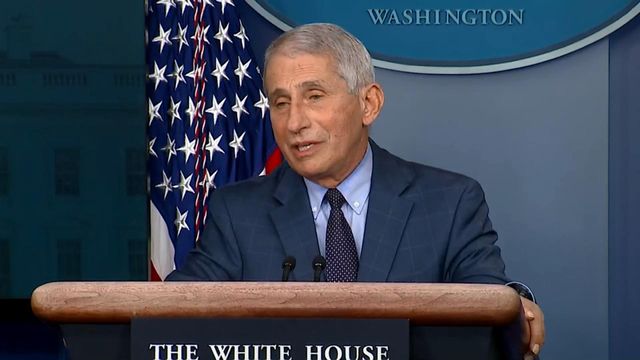As US sees new high for Covid-19 hospitalizations, states are preparing for vaccine rollouts
With the rollout of new vaccines for coronavirus just a few weeks away, the importance of inoculating people and following health guidelines grew even more apparent Tuesday as US hospitals reported a record number of patients with Covid-19.
Posted — UpdatedAccording to the Covid Tracking Project, there were 98,691 Covid patients as of Tuesday, 2,638 more than Monday's figure, the previous high.
The volunteer tracking organization said Tuesday's total is more than double the number of hospitalizations reported November 1, and more than triple the total of patients reported October 1.
The news comes as states prepare to receive vaccines and an advisory committee to the US Centers for Disease Control and Prevention recommends who gets the vaccines first.
States are testing their vaccine data systems -- submitting files that are then received by a CDC clearinghouse.
"All the states are going through testing," said Claire Hannan, executive director of the Association of Immunization Managers, which is helping states with their immunization plans. "Everybody's got to pass that test to make sure that they can transmit data, that their providers are enrolled successfully, that they can transmit orders and receive communication in the data system."
The first two vaccines available to Americans will be shipped in a few weeks, according to a document from the federal government's Operation Warp Speed.
The first shipments of Pfizer's coronavirus vaccine will be delivered December 15 and Moderna's vaccine will start to be delivered December 22, the document, provided to governors ahead of a call with Vice President Mike Pence and obtained by CNN, says.
An advisory panel to the CDC recommended Tuesday that heath care and long-term care workers get inoculated first as the vaccines are rolled out.
As Americans wait for vaccines, Covid-19 has been spreading quickly. Johns Hopkins University data reports the United States has reached more than 13.7 million total cases and 270,450 deaths.
Upcoming holiday gatherings around Christmas and Hanukkah could further spread infections.
Companies await approval to proceed with vaccines
The vaccine candidates from Pfizer and Moderna are awaiting emergency use authorizations (EUA). States have until Friday to request the number of doses for Pfizer's vaccine, Hannan told CNN on Monday.
Stephen Hoge, the president of Moderna, told NBC that they are "quite optimistic" when it comes to authorization of their Covid-19 vaccine candidate.
Once the US Food and Drug Administration grants EUAs, they will be ready to be shipped out, Dr. Moncef Slaoui, Operation Warp Speed chief scientific adviser, said Monday. And that very day or the next, the first immunizations can be administered, he said.
Panel: Health care workers and patients in long term care should get vaccines first
At first there won't be enough vaccines to go around.
Although federal officials expect to have 40 million doses of coronavirus vaccine available by the end of December, those doses will not all be available at once, CDC vaccine advisers were told Tuesday.
The CDC's Dr. Sara Oliver told the Advisory Committee on Immunization Practices that the CDC expects between 5 million and 10 million doses to become available each week for the first few months as vaccine makers ramp up manufacturing.
The decision on who should get the vaccines first was made by the committee, a panel of independent advisers to the CDC. They decided Tuesday afternoon to recommend that both health care workers and residents of long-term care facilities go to the front of the line.
Florida surpasses 1 million cases
But even after vaccines start to be distributed, there won't be enough for the wider public to be immunized until April or May of 2021, Dr. Anthony Fauci, the nation's top infectious disease doctor, said. Until then, the US is still contending with an unprecedented spike.
Florida became the third state to surpass 1 million cumulative Covid-19 cases on Tuesday, following behind Texas and California, according to the Florida State Department of Health.
In Minnesota, more than a third of counties are 10 times over what would be considered a high-risk threshold for infection rate growth as the state is in "the worst spot we've been in since March," Minnesota Department of Health Commissioner Jan Malcolm said Monday.
"When there's this great increase in the number of Minnesotans needing hospitalization for Covid, that can have some really serious implications for the availability of hospital care for other critical issues as well," Malcolm said. "And the number of people being admitted for Covid is far overshadowing what we saw back in May."
At least 35 hospitals in Minnesota are reporting over 95% of their staffed ICU beds are in use, according to the state's dashboard.
To manage the risk of reopening, New Mexico Gov. Michelle Lujan Grisham announced a new "Red to Green" system that tiers counties by their risk of spread. The data will be updated biweekly, and if a county fails to meet the metrics, it will begin operating at the most restrictive level within 48 hours.
Nationally, Tuesday marked the 29th consecutive day that the United States reported more than 100,000 new cases -- a number that far exceeds the records set in the spring and summer surges, which both stayed below 60,000.
Hospitals under stress
As hospitalizations increase over the holiday season, health care systems are under stress.
California Gov. Gavin Newsom on Monday told reporters that the intensive care unit bed capacity in the state might reach 112% by Christmas Eve, if the trend of surging coronavirus cases continues.
In Rhode Island, officials have prepared to use field hospitals after telling residents their systems were already at capacity.
In New York, where some hospitals saw room capacity taxed in March, Gov. Andrew Cuomo said this time medical systems need to take steps to move patients to other facilities that have space.
"No patient wants to be in an overwhelmed hospital, because you're getting less care, the staff is stretched thin, it's in the patient's best interest, distribute the patient load over the system," Cuomo said Monday. "We're not going to live through the nightmare of overwhelmed hospitals again."
Health care systems might be even more strained this time around because researchers are now seeing people affected by the virus even after they no longer show symptoms, Fauci said.
Some, called "long haulers," experience lingering symptoms for months. Others see residual and perhaps indefinite organ system dysfunction, he said.
"The idea that you get infected, you either get no symptoms or you die, and if you don't die, you're OK -- I think that's really a misperception," he added.
New York City Health Commissioner Dr. Dave Chokshi issued a notice that warns at-risk older adults and those with underlying health issues to stay in their homes as much as possible.
Under the health advisory, the commissioner is calling on those people to limit outdoor activities and stop non-essential travel. It also asks anyone who is around those populations to wear a face covering.
Copyright 2024 by Cable News Network, Inc., a Time Warner Company. All rights reserved.






